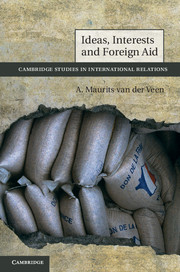Book contents
- Frontmatter
- Contents
- Figures
- Tables
- Preface
- 1 The many uses of foreign aid
- 2 One policy, multiple goals
- 3 Debates about aid
- 4 Aid frames
- 5 The administration of aid policy
- 6 The generosity contest
- 7 The popularity contest
- 8 Conclusion
- Appendix A Legislative debates coded
- Appendix B Debate coding examples
- Appendix C Aid distribution: data and sources
- Bibliography
- Index
8 - Conclusion
frames and policy
Published online by Cambridge University Press: 07 September 2011
- Frontmatter
- Contents
- Figures
- Tables
- Preface
- 1 The many uses of foreign aid
- 2 One policy, multiple goals
- 3 Debates about aid
- 4 Aid frames
- 5 The administration of aid policy
- 6 The generosity contest
- 7 The popularity contest
- 8 Conclusion
- Appendix A Legislative debates coded
- Appendix B Debate coding examples
- Appendix C Aid distribution: data and sources
- Bibliography
- Index
Summary
The financial, political and emotional interests behind foreign aid will help to ensure that [the long list of] rationalizations [for aid] will persist and others will be put forward.
– Peter Bauer, Reality and rhetoricI do not have a model … There are too many interacting variables to justify a model that would be both parsimonious and insightful.
– Carol Lancaster, Foreign aidPolicy-making is rarely straightforward. No issue area stands alone, and multiple different goals and motivations may be relevant at any given time. Thus aid policy cannot be reduced simply to the expression of a ‘moral vision’, nor to any particular ‘national interest’. It is, rather, governed by the interaction of many different frames for aid. As I have argued throughout this study, this makes it akin to a Swiss army knife: one tool, many functions. Or, as Italian legislator Grassi put it in 1995: aid is best seen simply as an ‘instrument of which the large Western countries avail themselves today’. As such, even though Italians called into question one long-established frame for aid – economic self-interest – in the mid 1990s, Grassi argued that aid’s value as an instrument for other frames implied a need to ‘retain and safeguard our own development cooperation policy’. At the same time, and contrary to the note of resignation that comes through in the quotation from Lancaster’s valuable recent book on aid, this study has shown that it is in fact possible to develop a model that is both elegant and insightful, while remaining comparatively parsimonious.
This concluding chapter is divided into three parts. The first section briefly reviews the material covered in the preceding chapters. Next, I provide some anecdotal evidence to demonstrate the relevance of the model to other aspects of aid policy as well as to the aid policy of other donor states. Finally, I suggest how the model might be applied to the analysis of other policy areas in foreign as well as domestic politics, and discuss the challenges inherent in applying a framework that requires measuring how decision-makers think about a particular policy.
- Type
- Chapter
- Information
- Ideas, Interests and Foreign Aid , pp. 210 - 234Publisher: Cambridge University PressPrint publication year: 2011



